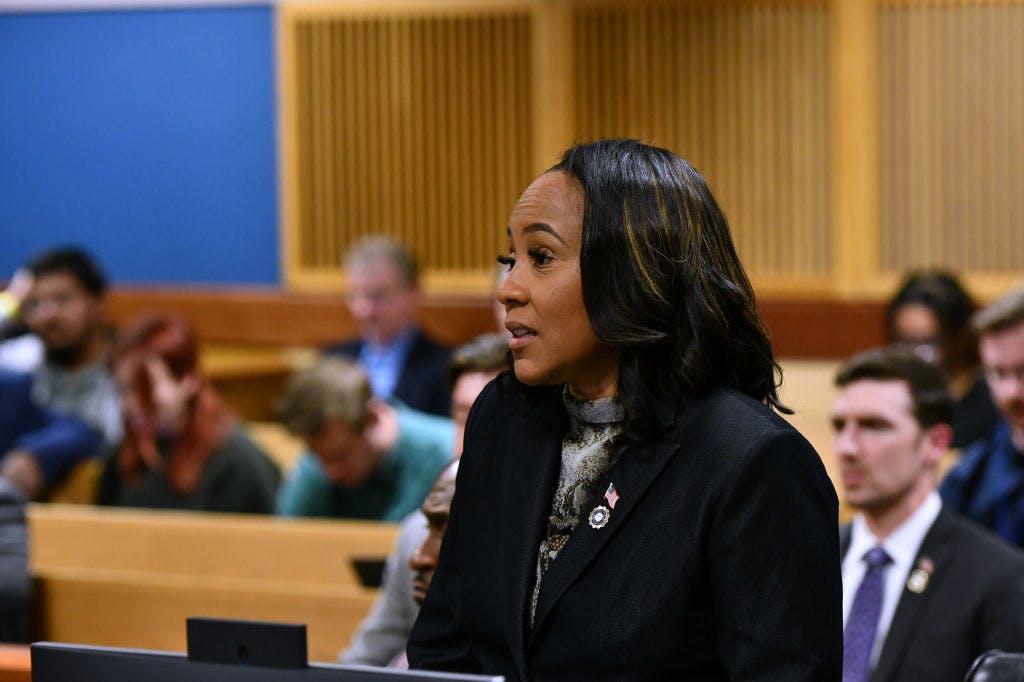Judge in Divorce Case of Fani Willis’s Alleged Boyfriend Demands To ‘Hear What He Has To Say’ as Prosecutor Faces New Pressure To Step Aside
The district attorney takes the position that because the special prosecutor’s marriage was ‘irretrievably broken,’ allegations of adultery are ‘not relevant.’

The issuance of a judicial stay delaying the deposition of the district attorney of Fulton County, Fani Willis, in the divorce case of her alleged boyfriend-turned-handpicked-special-prosecutor, Nathan Wade, shifts the focus to the tales he has to tell about a 26-year marriage that has collapsed in a welter of controversy.
A superior court judge of Cobb County, Henry Thompson, wants to “hear what Mr. Wade has to say” before determining if Ms. Willis’s testimony is necessary, according to ABC News. He also ruled that the divorce docket of that prosecutor, Nathan Wade, and his wife, Joycelyn, be unsealed.
The lifting of that veil could disclose details relating to the motion of one of Mr. Trump’s co-defendants, Michael Roman, that Ms. Willis and Mr. Wade be disqualified from the case and that the charges be dismissed. Mr. Roman alleges that the “district attorney and the special prosecutor have been engaged in an improper, clandestine personal relationship.”
Ms. Willis had been scheduled to testify on Tuesday in the divorce proceedings. Allegations that the district attorney is engaged in a romantic relationship with Mr. Wade, whom she employs, have gained legal salience with Mr. Roman’s accusation that both she and Mr. Wade are “profiting significantly from this prosecution at the expense of the taxpayers.” He also alleges that Mr. Wade was appointed improperly.
Mrs. Wade has been pushing for Ms. Willis’s testimony in order to “determine details” in respect of the relationship between her husband and the district attorney. Mr. Wade, who has never prosecuted a felony, has been paid more than $650,000 to lead the sprawling racketeering case against Mr. Trump and 18 others for alleged efforts to overturn the result of the 2020 election.
Judge Thompson wants to hear from Mr. Wade before he makes a determination of whether Ms. Willis has “any unique knowledge about these issues.” That species of information would justify ordering her to answer questions in a case in which she is not otherwise a party. An attorney for Mrs. Wade issued a statement that her client’s divorce appears to be “personal” for Ms. Willis.
Ms. Willis’s position, outlined in a filing intended to quash the now delayed subpoena, is that Mr. Wade’s union with Mrs. Wade was already “irretrievably broken” by the time the district attorney came to know Mr. Wade, and that she does not possess any information “that might prove relevant to granting or denying the divorce.” Ms. Willis alleges that Mrs. Wade’s marriage was fractured by an affair she undertook with a friend of Mr. Wade’s.
The order to unseal issued by Judge Thompson is a victory for Mrs. Wade and Mr. Roman, both of whom argued that it was in the “public interest” that the divorce documents be disclosed. A determination that Ms. Willis is not required to testify, though, could take some of the wind out of their sails. Some sensitive materials — there are more than 80 filings on the docket — could remain under seal.
A trail of receipts has added evidence to Mr. Roman’s claim of a conflict of interest. The financials indicate joint travel on the part of Mr. Wade and Ms. Willis. Ms. Willis’s attorney, Cinque Axam, told Judge Thompson that “alleging adultery is not relevant” because the case is one of “no fault” divorce, meaning blame is not relevant to the outcome.
Yet the fact that the marriage might have been “broken” might not mean that there’s nothing with which the law can deal. As a legal — and, for that matter, religious — concept, marriage is a contract, and courts can have plenty to say about when a contract can be ended and who was responsible for ending it.

